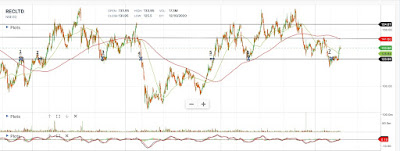Fundamental Analysis Part I-stock market commonly used terms
Fundamental analysis of stocks
It is hereby starting a new series on fundamental analysis of stocks. All contents related to this will be available under the label "Fundamental Analysis" on this page.
"The investment in knowledge pays the best interest". The more time you invest to enlighten your knowledge gives you the better returns. You may be heard about stock market investment in new on stock market before. As an introduction to this new article, the content on this page doesn't cover every aspect of stock market studies as it will be very lengthy and boring to read. So I am presenting this study as much as simple and more topic concentrated.
The Indian share market is a place where you can buy the shares of publicly listed companies in India. A publicly listed company is nothing but any company that offers an opportunity for the general public to buy its shares. Before going to the fundamental analysis of stocks, In this article I am introducing you to some common terms related to stock market. Because you have to be aware of these terms as an investor or a trader.
- Equity - Equity is the shares of publicly listed companies.
- Indian Stock Exchange - Stock exchange is the place where you can buy the shares of publicly listed companies. There are two main stock exchanges in India. They are Bombay stock exchange (BSE) and National stock exchange (NSE).
- Stock Market Participants - Any entity which makes a transaction in a stock market is a stock market participant.
- Securities and Exchange Board of India (SEBI) - SEBI functions as the regulator of activities in stock market and stays as a mediator to protect retail investors from fraudsters.
- Depositories - Depositories serve the function of storing the shares bought by the investors. Eg: NSDL, CDSL
- Demat Account - A place to hold the shares and securities in an electronic format. It is also called as Dematerialized account.
- Stock Brokers - The intermediary between the investors and the stock exchange. Stock brokers provide a trading account to the investors to transact in share market and also provide certain services to their investors.
- Initial Public Offering - Process of offering the shares of a company to general public. A company does IPO for raising funds for its activities. Eg: LIC IPO
- Holding period - It is the period in which you wish to hold the shares of a company. It may range from several minutes to several years depending on the period investors hold the shares in their Demat account.
- Index- A value that indicates the overall performance of top companies in stock market is called market index. Sensex is the index that represents BSE and Nifty represents NSE.
- T-Day - The day you make a transaction is called trade date.
- Dividends - Dividends are the part of profits made by the company which distributes to its investors during the year. I have already published the importance of dividends in an article on this page. It will be useful to understand the returns that dividends can generate over time.
- Bonus share - It is a reward issued by the company to its shareholders as shares. These are free shares allotted to the investors against the shares that they currently hold.
- Stock Split - It is a corporate action in which a company reduces its face value in a ratio and increases the number of shares. The overall market capitalization of the company remains the same even after the stock split.
- Buyback - The action of buying shares from the investors themselves. It is usually considered a positive factor as it represents the confidence in the performance of the company.
- Annual financial report - It is the record that represents the performance of a company during the financial year issued by the company itself.
This article is an introduction to the common terms related to the stock market. It will be a reference for the upcoming contents on fundamental analysis. The topic is very vast and there will be mistakes that you can recognize. Please give your suggestions on any updation that has to be done and corrections regarding the content.
Related articles : Fundamental Analysis Part 2 - Introduction to fundamental analysis
Related articles : Fundamental Analysis of stocks Part 3 - Tools required for fundamental analysis
Amazon ads : Fundamental Analysis Shares : Become An Intelligent Investor



Contributing is the need of great importance and we experience various difficulties prior to getting everything rolling with our venture process! Visit Our Youtube Video For Knowlegable Videos.
ReplyDeletestock market investment Doctor